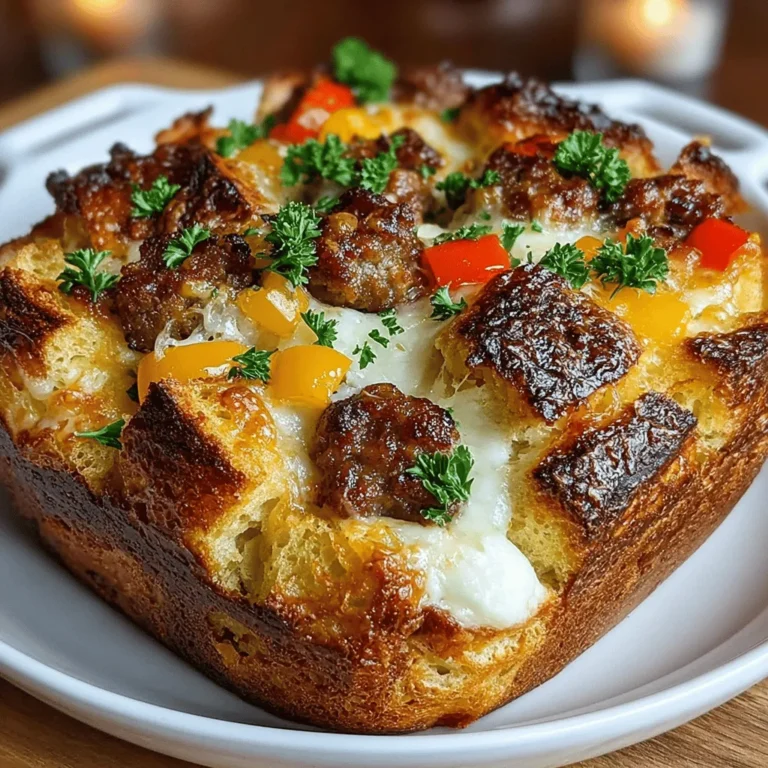Savory Sausage and Sweet Pepper Strata: A Delicious Start to Your Day
Strata is a culinary gem that effortlessly blends the comfort of a hearty breakfast with the sophistication of a brunch dish. Often described as a baked egg casserole, strata is an incredibly versatile dish that allows for endless variations, making it perfect for any occasion. Whether you’re hosting a leisurely Sunday brunch, enjoying a festive holiday gathering, or simply looking for a satisfying breakfast to start your day, the Savory Sausage and Sweet Pepper Strata will surely impress your guests and family alike.
This particular recipe combines the robust flavors of Italian sausage with the sweetness of bell peppers, creating a harmonious balance that is both satisfying and delicious. The layers of fluffy bread soaked in a rich egg mixture, complemented by the savory sausage and vibrant vegetables, provide a delightful textural contrast that makes each bite an experience. It’s a dish that not only looks beautiful when served but also fills the room with an enticing aroma as it bakes, making it a true crowd-pleaser.
Understanding Strata: A Culinary Classic
At its core, strata is a dish that consists of layers of bread, eggs, and various fillings, all baked to perfection. The name “strata” comes from the Latin word for “layers,” which aptly describes the way the dish is prepared. Its origins can be traced back to Italy, where it was traditionally made using leftover bread, eggs, and seasonal ingredients, allowing cooks to utilize what they had on hand. Over the years, strata has evolved and gained popularity, especially in North American brunch menus, where it is often featured as a make-ahead option.
One of the most appealing aspects of strata is its adaptability. Cooks can experiment with different ingredients based on personal preferences or what is available in their pantry. This flexibility has contributed to its rise as a popular dish in various culinary traditions. Strata is excellent for meal prep; it can be assembled the night before and left to rest in the refrigerator, allowing the flavors to meld beautifully. When you’re ready to serve, simply pop it in the oven, and you’ll have a delicious, warm dish ready to go without the stress of last-minute cooking.
Key Ingredients in Savory Sausage and Sweet Pepper Strata
To create a truly memorable Savory Sausage and Sweet Pepper Strata, you’ll need to gather a few key ingredients, each playing a crucial role in the dish’s overall flavor and texture.
– Day-Old French Bread: The foundation of any strata is the bread. Using day-old French bread is essential, as its slightly stale texture allows it to absorb the egg mixture without becoming mushy. This absorption is critical for creating a custard-like filling that is both moist and flavorful.
– Italian Sausage: The choice of sausage can make or break your strata. Italian sausage, whether mild or spicy, adds a depth of flavor that enhances the overall dish. The savory notes of the sausage pair beautifully with the sweetness of the peppers, creating a balanced flavor profile.
– Fresh Vegetables: Bell peppers and onions are the stars in this strata. Not only do they contribute vibrant colors, but they also add essential nutrients and a natural sweetness that complements the savory elements. Using fresh vegetables ensures that the dish is not only tasty but also nutritious.
– Eggs and Cheese: Eggs are the binding agent in strata, creating a cohesive mixture that holds all the ingredients together. The addition of cheese, such as cheddar or mozzarella, enhances the creaminess and adds a rich, savory element to the dish.
– Seasonings: Dried herbs like oregano and basil elevate the flavor of the strata, infusing it with aromatic notes that bring the dish to life. These seasonings are essential for rounding out the flavors and enhancing the overall taste.
Step-by-Step Instructions for Preparing Savory Sausage and Sweet Pepper Strata
Now that you have a good understanding of what makes this strata special, let’s dive into the initial steps for preparing the Savory Sausage and Sweet Pepper Strata. The first step is to prepare your baking dish, which is crucial for achieving a perfect bake.
1. Prepping the Baking Dish: Start by greasing a 9×13-inch baking dish generously with butter or cooking spray. This step is essential to prevent the strata from sticking to the dish as it bakes. A well-greased dish will ensure that your strata comes out easily and retains its beautiful shape.
With the baking dish ready, you can move on to the fun part: cooking the sausage and preparing the vegetable mixture. This step not only adds flavor but also sets the stage for the layers to come.
As you embark on this journey to create a mouthwatering Savory Sausage and Sweet Pepper Strata, remember that it is a dish that celebrates the joy of cooking and sharing meals with loved ones. The combination of flavors and textures in this strata makes it a standout choice for breakfast or brunch, promising to leave everyone asking for seconds.
{{image_2}}
Cooking the Sausage
To create a deliciously savory base for your strata, the sausage must be cooked to perfection. Start by selecting a high-quality sausage, whether it’s pork, chicken, or turkey, based on your preference. The key to achieving that perfect browning and flavor development lies in the cooking technique.
1. Use a Skillet: Heat a non-stick or cast-iron skillet over medium heat. Avoid overcrowding the pan; if you’re cooking a lot of sausage, do so in batches. This allows for better browning and prevents steaming.
2. Break It Up: As the sausage cooks, use a wooden spoon or spatula to break it into bite-sized pieces. This not only helps with even cooking but also enhances the texture throughout the strata.
3. Cook Until Golden: Sauté the sausage until it’s nicely browned and cooked through, which typically takes about 5-7 minutes. Look for a deep golden color and ensure there is no pink remaining in the center. This will not only develop more flavor but also add a satisfying texture to your strata.
4. Drain Excess Fat: Once cooked, transfer the sausage to a paper towel-lined plate to drain any excess fat. This step ensures your strata doesn’t become too greasy and maintains a balanced flavor.
Sautéing the Vegetables
Next, the vegetables play a crucial role in adding flavor and texture to your strata. Bell peppers, onions, and garlic are common choices, but feel free to get creative with seasonal vegetables.
1. Select Fresh Ingredients: Choose vibrant, fresh bell peppers (red, yellow, or green) and a sweet onion for the best flavor.
2. Cook Over Medium Heat: In the same skillet used for the sausage, add a drizzle of olive oil, if necessary. Heat it over medium heat, then add your chopped onions. Sauté for about 2-3 minutes until they become translucent.
3. Add Bell Peppers: Next, add your diced bell peppers and continue to sauté for another 3-5 minutes. You want them to be tender but still firm enough to provide a good texture in the strata.
4. Infuse with Garlic: In the last minute of cooking, add minced garlic and sauté until fragrant. Garlic cooks quickly, so keep an eye on it to prevent burning. This step adds a wonderful aroma and depth to the dish.
5. Season to Taste: Season the vegetables with salt, pepper, and any herbs you like, such as thyme or oregano. This will help enhance the natural flavors and ensure a well-rounded taste.
Preparing the Egg Mixture
Now, let’s create the custard base that will hold your strata together. A well-balanced egg mixture is key to achieving the perfect texture.
1. Choose Your Eggs: For a rich and creamy custard, use large eggs. The standard ratio is about 6 eggs for a 9×13 inch strata, which will yield about 8 servings.
2. Whisk Together: In a large mixing bowl, whisk the eggs until they are well combined. The more air you incorporate, the fluffier your strata will be.
3. Add Dairy: Pour in whole milk or half-and-half to create a creamy texture. A general rule of thumb is about 2 cups of dairy for every 6 eggs. Whisk again until fully combined.
4. Season the Mixture: Add salt, pepper, and your choice of seasonings or herbs. Consider adding a pinch of nutmeg for warmth or some grated cheese for added flavor.
5. Incorporate Cheese: If desired, stir in shredded cheese such as cheddar or mozzarella to the egg mixture. This will add richness and a delicious melty texture.
Assembling the Strata
With all components prepared, it’s time to assemble your strata. The layering technique is crucial for optimal flavor distribution.
1. Prepare the Baking Dish: Lightly grease a 9×13 inch baking dish with butter or cooking spray. This prevents the strata from sticking and ensures easy serving.
2. Layer the Bread: Start by laying down slices of your chosen bread (such as crusty French bread or whole grain) on the bottom of the dish. Aim for a single even layer, ensuring there are no gaps.
3. Add the Sausage and Vegetables: Spread the cooked sausage evenly over the bread layer, followed by the sautéed vegetables. If you’re using cheese, sprinkle some of it over this layer too.
4. Pour the Egg Mixture: Carefully pour the egg mixture over the layered ingredients, ensuring it seeps through the bread. Use a spatula to gently press down the bread to help it absorb the custard.
5. Top with Remaining Cheese: If you held back some cheese, sprinkle it on top for a deliciously cheesy crust when baked.
Chilling the Dish
Allowing your strata to rest overnight in the refrigerator has significant benefits. This chilling period is essential for flavor melding and ensuring that the bread absorbs the custard thoroughly.
1. Cover and Chill: After assembling, cover the dish tightly with plastic wrap or aluminum foil. This prevents the strata from drying out and allows the flavors to deepen.
2. Overnight Rest: Refrigerate for at least 4 hours or, ideally, overnight. This allows the bread to soak up the egg mixture, resulting in a custardy texture after baking.
Baking Tips
When you’re ready to bake, follow these tips to ensure even cooking and a perfectly golden-brown top.
1. Preheat the Oven: Preheat your oven to 350°F (175°C). A properly heated oven is crucial for even cooking.
2. Remove from Fridge: Take the strata out of the refrigerator while the oven preheats. This helps bring the dish to room temperature, aiding in even baking.
3. Bake Covered and Uncovered: Start by covering the baking dish with aluminum foil to prevent over-browning. Bake for 30-35 minutes covered, then remove the foil and bake for an additional 15-20 minutes, or until the top is golden brown and a knife inserted in the center comes out clean.
4. Let it Rest: Once baked, allow the strata to rest for 10-15 minutes before slicing. This waiting period allows it to set, making it easier to cut and serve.
Serving Suggestions for Savory Sausage and Sweet Pepper Strata
When it comes time to serve your savory sausage and sweet pepper strata, presentation and complementary flavors are key to a delightful dining experience.
Presentation Ideas
1. Garnish for Visual Appeal: Transfer the strata onto a large serving platter and garnish with fresh herbs, such as parsley or basil. A sprinkle of microgreens adds a sophisticated touch.
2. Slice Neatly: Use a sharp knife to cut neat squares or triangles for serving. This will not only enhance the presentation but make it easier for guests to serve themselves.
Complementary Side Dishes
1. Fresh Salads: Pair your strata with a light salad, such as a mixed greens salad with a tangy vinaigrette. This adds a refreshing contrast to the richness of the strata.
2. Seasonal Fruits: Fresh fruit, such as sliced strawberries, melon, or citrus, complements the savory flavors beautifully and provides a sweet balance.
Ideal Occasions for Serving Strata
1. Family Gatherings: This hearty dish is perfect for family breakfasts or brunches, allowing everyone to enjoy a comforting meal together.
2. Brunch Parties: Impress your brunch guests with this no-fuss, crowd-pleasing dish that can be prepared ahead of time.
3. Holiday Breakfasts: Serve your strata during special occasions like Easter or Christmas. Its festive colors and flavors are sure to delight.
Nutritional Insights and Dietary Considerations
Understanding the nutritional components of your dish and potential adaptations for dietary needs can enhance your culinary experience.
Breakdown of Key Nutritional Components
1. Protein: With eggs and sausage, this strata is high in protein, making it a filling and satisfying meal option.
2. Vitamins and Minerals: The addition of vegetables contributes essential vitamins and minerals, such as vitamin C and fiber, promoting overall health.
Potential Adaptations for Dietary Restrictions
1. Gluten-Free Options: To accommodate gluten-sensitive diners, use gluten-free bread. There are many delicious options available that maintain the dish’s integrity.
2. Vegetarian Variants: Substitute the sausage with vegetarian sausage or sautéed mushrooms to create a meat-free version that still packs a flavorful punch.
Portion Control
1. Serving Sizes: A 9×13 inch strata typically yields about 8 servings, making it easy to serve family-style.
2. Balancing with Other Components: Consider pairing smaller portions of strata with your salad and fruit sides to create a well-rounded meal that is satisfying without being overly heavy.
Conclusion
The savory sausage and sweet pepper strata is not just a breakfast dish; it’s a versatile, crowd-pleasing option perfect for any occasion. Its layers of flavor, textures, and ease of preparation make it a favorite for gatherings, family breakfasts, or holiday celebrations.
Encouraging you to try this recipe means inviting you to experience the joy of cooking and sharing delicious homemade dishes with loved ones. This strata is easy to prepare, offers delightful flavors, and allows for creativity in your kitchen. Whether you’re enjoying it with family or friends, this dish promises to bring smiles and satisfaction to the table. So grab your ingredients, follow the steps, and indulge in the comfort of a beautifully crafted strata that’s sure to impress.


